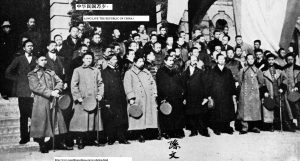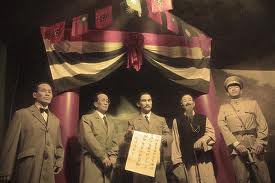Memo#107
(The fourth Memo from the Theme, 100 Years after the Xinhai Revolution)
By Timothy Brook – tim.brook [at] ubc.ca
 For many Chinese, the Xinhai Revolution will be recalled on October 10 as modern China’s founding moment a century ago. The revolution ended an imperial system whose foundations go back millennia. In those terms, 1911 was a great success. But suppose that, rather than look backward, we look ahead. What if we measured the republican revolution by the republic it ushered in, and not the empire it ushered out?
For many Chinese, the Xinhai Revolution will be recalled on October 10 as modern China’s founding moment a century ago. The revolution ended an imperial system whose foundations go back millennia. In those terms, 1911 was a great success. But suppose that, rather than look backward, we look ahead. What if we measured the republican revolution by the republic it ushered in, and not the empire it ushered out?
From this perspective, 1911 was not a success. The new president, Sun Yat-sen, was shoved from office within five weeks of founding the republic. His loosely conceived ideology of minzu (民族), minquan (民權), minsheng (民生) – a rough rephrasing of Abraham Lincoln’s Gettysburg formula, “of the people, by the people, for the people” – was either brushed aside or kept on as decoration by subsequent regimes. The only principle sometimes honoured was minsheng, the idea that the government should act “for the people” to ensure their economic well being. As for the notion that the government should consist of representatives of the people rather than a tiny oligarchy and its closest families, that was a republican ideal no Chinese state since 1911 has been willing to embrace.
The scuttling of Sun’s republic is conventionally brushed aside as the misfortunate outcome of high politics rather than a failure of institutional reconstruction. The proof? The republic did not revert to empire. But is the absence of an emperor proof of the existence of a republic?
Today we can phrase that question yet another way: does the existence of a people’s republic still justify the absence of a republic on the mainland, as it did in 1949? The Leninist model of forced state socialism was a popular response to regime failure throughout the third world during the Cold War. But the model has almost entirely been abandoned, with the exception of North Korea, Laos, and Vietnam. Standing alongside them is China, the sole people’s republic.
Confucius was the first philosopher to explain to the world that words matter. “When words are not correct, what is said is not truthful,” he declared. “And when what is said is not truthful, what must be done is impossible to do.” We will all go on naming the Xinhai Revolution as China’s republican revolution, but some of us, a hundred years on, are still waiting for the republic to arrive.
About the Author:
Timothy Brook – Republic of China Chair in Chinese Research, Institute of Asian Research, The University of British Columbia.

The inauguration of the Republic of China in Nanjing. January 1, 1912. (Sun Yat-sen signed copy of commemorative photograph).
Related Memos:
- Our Theme on the Origins of Social Protests in China
